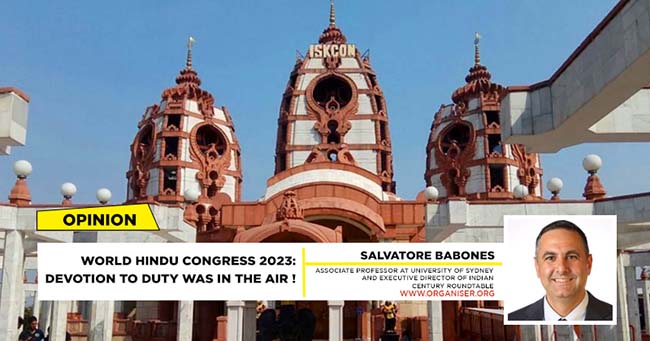The United States celebrates its annual Thanksgiving holiday on the second-to-last Thursday of November. Designed to mark the 1622 reconciliation between early Pilgrim settlers of Massachusetts and their native American neighbours, the holiday was first proclaimed in 1863 by President Abraham Lincoln in the midst of the American Civil War. While the explicit meaning of Thanksgiving was historical, its implicit promise was that after the war between the states, North and South would likewise find a way to live peacefully together.
Thanksgiving 2023 found me in the air, flying from my home in Sydney, Australia to attend the recently concluded World Hindu Congress (WHC) in Bangkok, Thailand. An American abroad (and a vegetarian to boot), I had long given up the traditional Thanksgiving meal of roast turkey. Arriving at the WHC just in time for the opening session, this Thanksgiving I dined on aloo, dal, and ghee. And I dined with a Krishna devotee from ISKCON.
Bharatiyas (I hope that’s correct; we were not allowed to use the words India, Indian, or Indians at the WHC) will be very familiar with the International Society for Krishna Consciousness (ISKCON). Ironically, most Americans are not. Ironically, because ISKCON was founded in New York, where Swami Prabhupada began his mission to the English-speaking world in 1966. Equally ironic is the fact that ISKCON’s presence is now much larger in Bharat than it is in the West.
Changing Mindset
In the United States, ISKCON members are referred to derisively as Hare Krishnas, and although no Indian would consider Hare Krishna as an insult, for Americans it is not a complimentary label. Few Americans have any understanding of the meaning of the phrase, which they associate more with Western hippies than with Hindu monks. Like the Swastika, cow veneration, and the caste system, Krishna consciousness is a mystery to the American mind.
That should change, and through the good work of the delegates at the 2023 World Hindu Congress, it will change. Westerners don’t have to become Hindus to benefit from Krishna consciousness; Krishna’s exhortation to duty is a blessing to people of all religions, and none. Duty is the heart of Krishna’s teachings in the Bhagavad Gita. Call it Dharma if you must, but no less an authority than Sarvepalli Radhakrishnan famously defined Dharma simply as ‘right action’. For an English equivalent, duty will do.
Hindus may read the Bhagavad Gita as a holy book, but anyone can read it as an instructive and inspiring guide to life. I was given three Bhagavad Gitas at the World Hindu Congress: the first printed in Hindi (I think), the second a parallel translation text, and the third a new English-language translation. I kept the third, and will read it. It was a gift from the translator himself, Dr Rajesh Bhatia of Ontario, Canada.
Krishna consciousness may be a mystery to average Westerners. This will change post-World Hindu Congress in Thailand
Devotion to duty was thick in the air at the World Hindu Congress. Many monks attended, and of course everyone could see how they practice duty in every aspect of their lives. But real social progress depends on the much more widespread work of lay people. The WHC was only made possible by that part of Hindu lay society that is embodied in the Vishva Hindu Parishad, but the VHP is only the tip of the proverbial iceberg. Organised Hindu lay society is active in all walks of life, and all walks of life were represented at the Congress.
Educate World About Sri Krishna
It will take a big team to educate the world about Krishna’s message of duty—and about Sanatan Dharma more broadly. A major goal should be to see the Bhagavad Gita added to standard school reading lists, not only in diaspora communities, but for everyone. Shorn of its religious connotations, it is a fundamental text with which every literate person should be familiar. Even an atheist can learn from Krishna’s lessons to Arjun, and take inspiration from them.
But not everyone is destined to be a Kshatriya like Arjun, and the warrior duty is thankfully a rare one. For every Kshatriya, society needs ten Shudras, and Hindus would do well to remember that there is no less honour in the work of a Shudra. The American Thanksgiving holiday was created in wartime to celebrate the farmer. The World Hindu Congress was likewise the work of patient tillers of the moral soil, and all the more consequential for it.




















Comments